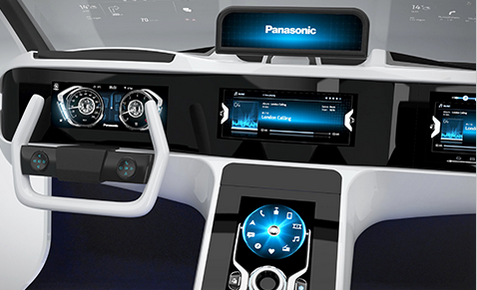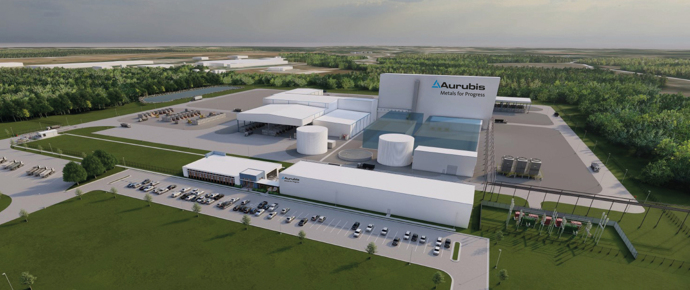Georgia Business Assets a Powerful Magnet for Electric Vehicle Industry
Lithium-ion batteries do not have magnetic properties, but a company in Georgia that makes them certainly does. Since Korea-based SK Battery America announced a huge new $1.67 billion advanced manufacturing plant near Atlanta in 2018, it has not only expanded to a second facility in the state, but also attracted numerous suppliers and ancillary companies in the electric vehicle (EV) industry to Georgia.

SK On is just one of numerous innovative companies drawn to the state’s business advantages, contributing to a critical mass of companies now vertically integrating Georgia’s booming EV sector.
U.S. plug-in electric vehicle sales nearly doubled from 2020 to 2021, growing by 85%, and Georgia is meeting that surge, developing the EV manufacturing sector at every step of the supply chain.
To accelerate this growth, in 2021 Governor Brian Kemp launched the Electric Mobility and Innovation Alliance (EMIA), a statewide initiative between government, industries, electric utilities, nonprofits, and other relevant stakeholders focused on growing the electric mobility ecosystem in the state and strengthening Georgia’s position in electrification-related manufacturing and innovation.
In recent months, the state attracted the two largest economic development investments in its history: American EV startup Rivian, and Korea-based Hyundai Motor Group. In May 2022, Hyundai Motor Group selected the state for its first fully dedicated electric vehicle (EV) and battery manufacturing facility. The company's $5.54 billion manufacturing facility will have production capacity of 300,000 annually.
In 2021, Rivian selected Georgia to locate a $5 billion carbon-conscious EV manufacturing plant able to produce up to 400,000 vehicles annually. Georgia’s robust infrastructure and work on speed-to-market needs, ability to meet renewable energy and sustainability goals, and availability of quality talent were key decision points. Rivian has developed and vertically integrated a connected electric platform that supports a range of applications, including the company’s adventure products as well as B2B products such as its last-mile delivery vans, launched in partnership with Amazon.
Georgia is at the center of the rapidly expanding Southeast Automotive Alley, and its rich EV ecosystem, accelerated by the arrival of Rivian and SK Battery America, has grown exponentially. Within the last five years, more than 75 automotive-related companies, many international, have located or expanded operations in Georgia.
Korean manufacturer Enchem, SK’s first announced supplier, plans to build two plants nearby. Enchem develops and makes electrolytes for rechargeable batteries and electrostatic double-layer capacitors (ELDCs) to meet the increasing demand for EV batteries and energy storage systems.
Duckyang, another Korean supplier, plans a facility near SK to make electric mobility parts for automotive battery modules and energy storage systems. EcoPro BM, a Korea-based company with a presence in Georgia, will supply SK with 100,000 tons of nickel cathode annually.
GEDIA Automotive Group of Germany chose Georgia for its first advanced manufacturing plant in the Southeast. The plant will make lightweight parts for electric vehicles including Volkswagen, BMW, Mercedes-Benz, Volvo, and others.
 Existing companies in Georgia also contribute to the e-mobility ecosystem. For years the state has been the leading manufacturing center for golf carts, and school bus manufacturer Blue Bird introduced its all-electric bus in 2018. Other Georgia advanced manufacturers that produce lightweight parts for EVs include Solvay, which makes thermoplastic composites; Panasonic, creating smart mobility safety and vehicle infotainment features; Nifco KTW, molding lightweight plastic components; and YKK USA, which manufactures fasteners for EV interiors for the Japanese company.
Existing companies in Georgia also contribute to the e-mobility ecosystem. For years the state has been the leading manufacturing center for golf carts, and school bus manufacturer Blue Bird introduced its all-electric bus in 2018. Other Georgia advanced manufacturers that produce lightweight parts for EVs include Solvay, which makes thermoplastic composites; Panasonic, creating smart mobility safety and vehicle infotainment features; Nifco KTW, molding lightweight plastic components; and YKK USA, which manufactures fasteners for EV interiors for the Japanese company.
While electric vehicles reduce the carbon footprint, repurposing materials is critical to a truly sustainable future, and recycling companies drawn to Georgia bring the supply chain full circle.
Ascend Elements has announced a commercial-scale battery recycling plant that can process the equivalent of 70,000 vehicle batteries per year. Its innovative recycling process will extract and return to the supply chain critically scarce materials like lithium, cobalt, and nickel from batteries, reducing the need to find new sources.
“We selected Georgia primarily because of the growing electric vehicle and battery ecosystem in the state. Proximity to partners like SK Battery America is essential in the sustainable battery materials industry,” says Roger Lin, Ascend’s Vice President of Marketing and Government Relations.
Additionally, Germany’s Aurubis, a leading recycler of copper, precious metals, and non-ferrous materials worldwide, will open a $340 million plant in Georgia to process complex metal-bearing materials and return them to use.

Georgia is also committed to building out a charging infrastructure, a critical asset needed to encourage drivers to switch to EV. This commitment is also attracting innovative EV-related companies. Netherlands-based Heliox, a global leader in producing fast-charging systems for electric vehicles, including public transport as well as passenger and commercial vehicles, plans to establish its North American headquarters in Atlanta.
Also contributing to the charging infrastructure are existing Georgia companies like Siemens, which has partnered with Canadian company Nexii to develop a weather-proof, efficient charging structure. Pivet, a Cox Automotive brand, has partnered with Georgia Power and ChargePoint, a provider of electric vehicle charging networks, to deliver one of the Southeast’s largest EV-charging single property installations, near Hartsfield-Jackson Atlanta International Airport.
“As more businesses seek to reduce their carbon footprint, smart policies have allowed us to promote renewable power development and offer a comprehensive portfolio of clean energy options that give Georgia a competitive edge in attracting leading businesses across industries,” says GDEcD Commissioner Pat Wilson.
Learn more about our rapidly growing EV supply chain at /node/52681
